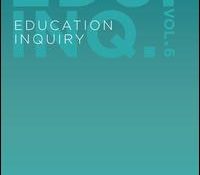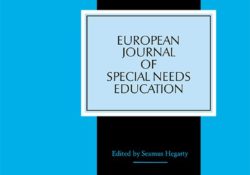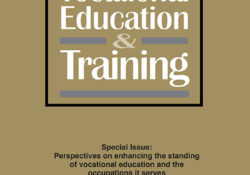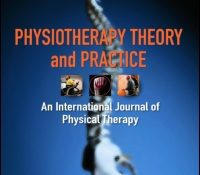tandfonline.com har udgivet en rapport under søgningen „Teacher Education Mathematics‟: ‘Wow! is that a birch leaf? In the picture it looked totally different’: a pragmatist perspective on deep learning in Norwegian ‘uteskole’ Link til kilde
Like this:
Like Loading...
tandfonline.com har udgivet en rapport under søgningen „Teacher Education Mathematics‟: ABSTRACT ABSTRACT This article addresses how elementary school teachers approach Bildung when planning and monitoring the in-school- and at-home work of 6- and 9-year-old pupils. By examining a national sample of 204 weekly work plans designed by teachers in Norwegian schools, we investigate whether and how curriculum practices acknowledge principles of Bildung by opening up multiple futures through encouraging pupils to engage in meaning-making processes. To identify how work plans structure pupils’ schoolwork, we adopt a system-theoretical framework that distinguishes between conditional and purposive programme forms. The most interesting finding is that a substantial number of the investigated teachers use a purposive programme form. Through specifying objectives and assessment criteria, the teachers expect that pupils will develop and master a… Continue Reading →
Like this:
Like Loading...
tandfonline.com har udgivet en rapport under søgningen „Teacher Education Mathematics‟: ABSTRACT ABSTRACT This article investigates how 9–13 years old pupils interpret activities involving the use of tablets in two Norwegian primary schools. The theoretical context draws on Goffman’s frame analysis and on research on young people’s digital literacy practices as socially situated meaning-making practices. Data was gathered through group interviews. The findings show that pupils framed activities involving tablets as engaging, enabling and playful, but also as teacher-directed and as challenging to their existing competences. Pupils’ framings were largely defined by what they expected to be of importance to their teachers but sometimes these also interrupted the teacher’s facilitation. The outcomes allow us to discuss the implications for pupils in developing digital competences, as a result of participation in a… Continue Reading →
Like this:
Like Loading...
tandfonline.com har udgivet en rapport under søgningen „Teacher Education Mathematics‟: ABSTRACT ABSTRACT In recent decades, most Nordic countries have seen reforms in their teacher education programme, giving rise to an ongoing debate on these programmes’ content, structure, and quality. As part of a recent reform of teacher education in Norway, new Master’s-level programme have been introduced to educate teachers for grades 5–10, whereby pre-service teachers (PSTs) take specialised content courses and undergo field placements twice a year. The purpose of this paper is to determine the effects of the specialised content courses on student teaching. In this study, we used a survey design to collect quantitative data from PSTs and qualitative data from mentor teachers. PSTs teaching subjects they specialised in had a more positive teaching experience related to perceived… Continue Reading →
Like this:
Like Loading...
tandfonline.com har udgivet en rapport under søgningen „Teacher Education Mathematics‟: ABSTRACT ABSTRACT Norwegian teachers and school leaders had to organise and provide homeschooling for their students from March to May 2020 due to the COVID-19 pandemic. A survey conducted in May 2020 examined lower secondary school students’ experiences of distance learning. How students at different levels of academic achievement (based on grades) experienced homeschooling was compared to comparable findings from a survey conducted on students from the same schools during the autumn of 2018. The findings indicate that students experienced less support and feedback from their teachers during homeschooling, and that teachers gave more written than oral feedback to the students during homeschooling than they do in regular school. Furthermore, there was a tendency of lower efforts and self-efficacy among… Continue Reading →
Like this:
Like Loading...
tandfonline.com har udgivet en rapport under søgningen „Teacher Education Mathematics‟: Abstract Formulae display:?Mathematical formulae have been encoded as MathML and are displayed in this HTML version using MathJax in order to improve their display. Uncheck the box to turn MathJax off. This feature requires Javascript. Click on a formula to zoom. Abstract In this article, we investigate the extent to which housing conditions are associated with school results for children living in Norway. We link individual exam results of students from three national exams in the 5th, 8th and 10th grades for all children living in Norway in the years 2015–2017, to a number of official national datasets including a novel housing register that has information on key housing characteristics for all households in Norway. We also use a newly… Continue Reading →
Like this:
Like Loading...
tandfonline.com har udgivet en rapport under søgningen „Teacher Education Mathematics‟: ABSTRACT ABSTRACT This study used a quasi-experimental design to evaluate the efficacy of the universal, school-based VIP-Makkerskap [VIP Partnership] programme. 1101 students in a test group and 734 students in a control group completed questionnaires one week (t1), ten weeks (t2), and six months (t3) after programme implementation. A one-way ANCOVA showed that at t2 and t3, students in the test group reported significantly higher social classroom environment scores than the control group, but the effect sizes were small (d = .10 and .09, respectively). Further analyses showed that five of the ten test schools accounted for the increase in the outcome variable from t1-t2. In these schools, a greater proportion of teachers had used the programme since its beginning… Continue Reading →
Like this:
Like Loading...
tandfonline.com har udgivet en rapport under søgningen „Teacher Education Mathematics‟: ABSTRACT ABSTRACT The status and quality of vocational education and training (VET) represent a challenge in many countries, including Norway. In recent decades the political goal in Norway has been to ensure that vocational programmes at upper secondary level achieve equal status with academic programmes. Considerable efforts have been made to strengthen the quality of vocational programmes to achieve this. This article presents an analysis of the challenges of the school-based part of Norwegian VET. The analysis is particularly directed at issues of vocational relevance and coherence between the educational content and the qualification needs of the vocations. The aim is to identify the obstacles to relevance and coherence and show the attempts made to strengthen both quality and status.… Continue Reading →
Like this:
Like Loading...
tandfonline.com har udgivet en rapport under søgningen „Teacher Education Mathematics‟: Physical education classes – a double-edged sword: a qualitative study of Norwegian high-school students’ experiences Link til kilde
Like this:
Like Loading...
tandfonline.com har udgivet en rapport under søgningen „Teacher Education Mathematics‟: ABSTRACT ABSTRACT The traditional exam has a strong holding within Norwegian higher education and is very often the preferred way of assessing students. Digital technology opens up for alternatives to the traditional exam, but so far focus has predominantly been on exchanging pen and paper with personal computers within the traditional framework. Digital alternatives may come in conflict with existing law governing teaching and assessment at university, as the law was written at a time when digital technology did not exist. We present data from a workshop in which 48 individuals from 11 institutions, academics as well as administration, were asked to identify and discuss challenges related to the introduction of digital alternatives. A case study strategy was considered appropriate… Continue Reading →
Like this:
Like Loading...









